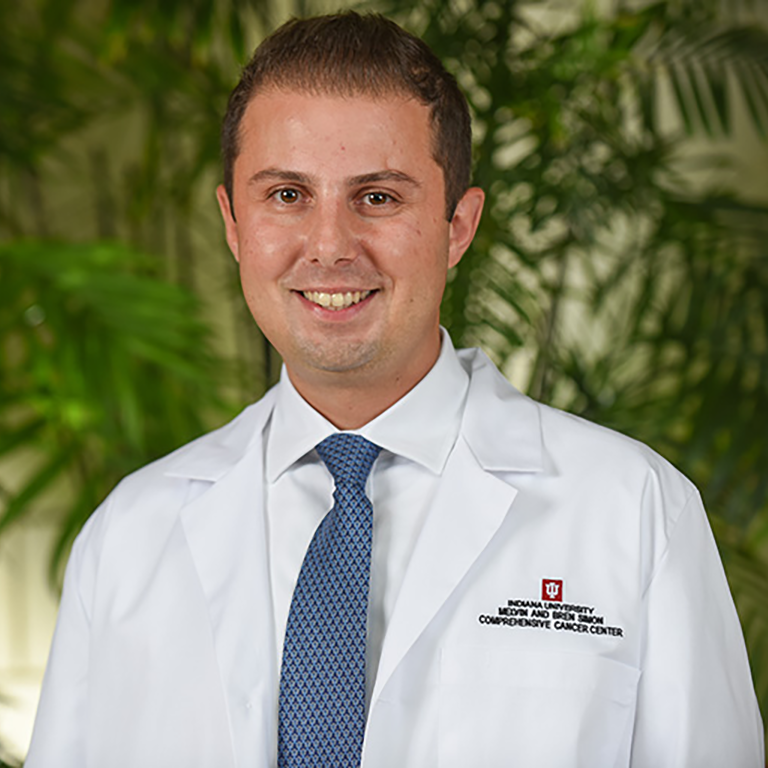Each year, there are nearly 300,000 new prostate cancer diagnoses in the United States, accounting for 14.7% of all new cancer cases—making it the most common cancer among men.
While most prostate cancers are found early and are cured with either surgery or radiation, it remains the second leading cause of cancer deaths among men in the United States. This subset of patients is diagnosed with advanced prostate cancer that has often spread to other parts of their body.
Advanced disease is a focus for Indiana University Melvin and Bren Simon Comprehensive Cancer Center researchers. Researchers are working to improve outcomes for metastatic prostate cancer and making sure new diagnostic and treatment options can accomplish a singular goal: curing prostate cancer.
IU is uniquely positioned to make critical advancements thanks to collaborative research among medical oncology, urology, radiation oncology, nuclear medicine, and cardio-oncology teams. Because everyone works together, discoveries move quickly to improve prostate cancer treatment and care for today’s patients.
Another critical component of our team are generous donors like you.
Prostate Cancer Research Update
Contributions to screening and treatments
Clinical trials at IU have helped lay the groundwork for FDA approval for new prostate cancer treatment and diagnostic options.
IU was part of the global research effort, including clinical trials, that led to the FDA approval of a new diagnostic imaging test called PSMA-PET. Specifically targeting prostate cancer, this scan can detect small amounts of prostate cancer that have spread from the prostate to other parts of the body, as well as aggressive cancer within the prostate. This tool helps physicians accurately stage prostate cancer, giving patients and physicians critical diagnostic information on how early or advanced the cancer is.
With a team science approach, IU’s radiology and urology departments made this test available to IU patients via Expanded Access Use beginning in 2016, before FDA approval advanced such imaging to nationwide availability in 2022. Mark Green, PhD, Mark Tann, MD, and Michael Koch, MD, led IU contributions to the PSMA-PET imaging development. Ongoing clinical studies led by Clint Bahler, MD, will allow researchers to continue refining this tool and its accuracy.
Another promising new approach developed in part at IU targets prostate cancer cells with a radioactive injection. The medicine finds prostate cancer cells and introduces radiation directly into those cells to kill them.

IU was among the institutions that took the lead collaborating with researchers worldwide and served as a site for Phase 3 clinical studies. Nabil Adra, MD, led the studies at IU and contributed to publications and data that led to the FDA approval in 2022.
“When this drug received FDA approval, it was a huge win for patients based on how successful it is in treating many people with prostate cancer,” Adra said.
Even with FDA approval, Dr. Adra’s research in this area continues. The new treatment is very effective for about 45% to 50% of patients, but he’s interested in why the treatment fails others. An IU team led by Adra is developing a way to predict who will and will not respond. Analyzing information from PSMA-PET imaging, they are predicting who will benefit from this drug and who would be better served with a different therapy.
Treatment advances

From immunotherapy to targeted chemotherapy, IU is conducting numerous clinical trials to expand treatment options for patients with localized or metastatic prostate cancer. Physicians are actively enrolling patients from Indiana and beyond.
A new targeted chemotherapy trial led by Dr. Adra and Jennifer King, MD, tests a treatment with the singular mission to seek out prostate cancer cells. This chemotherapy is tagged to an antibody that attaches to cancer cells, targeting only the cancer.
IU researchers are also looking at markers for response or resistance to prostate cancer treatments based on the genetic makeup of a patient’s cancer. Adra says that physicians can better tailor treatments by studying the genetic makeup of a patient's cancer cells. Using large datasets of genetic testing, researchers can predict which treatment approach is best for different patient populations.
Dr. Adra is particularly interested in addressing disparities among people with prostate cancer. Black men are more likely to develop more aggressive prostate cancer and, consequently, die at a higher rate. The reason for this is complex, and many things could contribute, including social determinants of health such as access to health care and socioeconomic status. Adra has a project to look at the biological and genetic differences among Black and white patients to determine if those factors are also contributing to this disparity.
Building our team of experts

Your philanthropic support helps IU build its team of prostate cancer researchers.
Tareq Salous, MBBS, completed his fellowship at IU in 2023 and joined the IU School of Medicine faculty. Working alongside Dr. Adra, he is a medical oncologist who focuses on prostate cancer clinical trials.

Asmaa El-Kenawi, PhD, has also joined IU Department of Urology. She discovered that certain prostate cancer immune cells are rich in cholesterol and promote cancer growth. In 2023, she received a National Cancer Institute exploratory grant to investigate how cholesterol accumulates in these prostate cancer cells and may drive resistance to specific therapies. The ultimate goal is to better understand these cell processes to improve targeted prostate cancer treatments.
In a gesture that continues their family’s long history of extraordinary generosity to IU cancer research, W. Gerald and Diane Throgmartin made a significant gift in 2023 to support prostate cancer research—a new area of support for the family. The gift established The W. Gerald Throgmartin Prostate Cancer Research Fund, honoring Dr. Adra.
Gerald is a long-term survivor of prostate cancer. He is grateful for the care of Dr. Adra and for the evolution of therapies driven by research that has made his own cancer journey relatively easy.
Support the Future of Prostate Cancer Research
Philanthropy maximizes IU Simon Comprehensive Cancer Center’s push to develop new therapies and answer questions that save lives.
For other ways to support prostate cancer research, contact Amber Kleopfer Senseny at 317-278-4510 or akleopfe@iu.edu.




